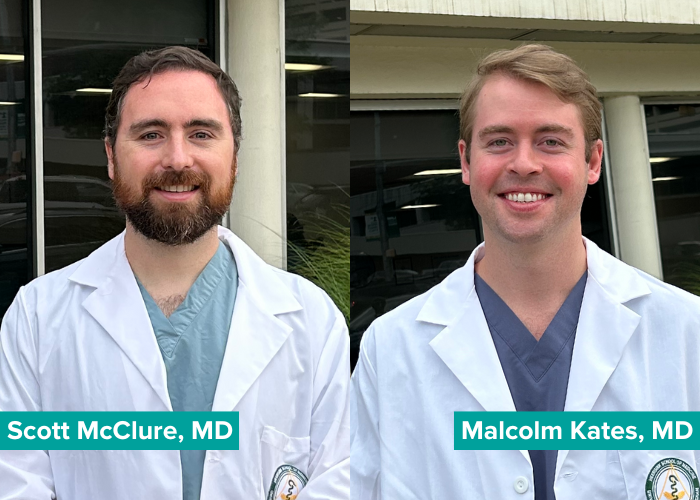Faculty
-
Medical professionals, state agencies and community partners look to develop new guidelines for concussed students
 Concussions are an invisible injury that can cause physical, cognitive, emotional and sleep symptoms that last for varying lengths of time depending on the nature of the injury. Changes in behavior, mood, learning and thinking that may be a result of a head injury can be misunderstood — making transitions into the classroom postconcussion difficult for students and teachers.
Concussions are an invisible injury that can cause physical, cognitive, emotional and sleep symptoms that last for varying lengths of time depending on the nature of the injury. Changes in behavior, mood, learning and thinking that may be a result of a head injury can be misunderstood — making transitions into the classroom postconcussion difficult for students and teachers. -
Medication Adherence During COVID-19 – New Research from Racette and Girkin
 Congratulations to Lyne Racette, PhD, and Christopher Girkin, MD, PhD, who recently published an article published in Ophthalmology. Here is the précis: Medication adherence declined in patients with glaucoma during the COVID-19 pandemic and this change appears to be related to patient resilience. This decline may translate into future vision loss and should be addressed by patients and providers.
Congratulations to Lyne Racette, PhD, and Christopher Girkin, MD, PhD, who recently published an article published in Ophthalmology. Here is the précis: Medication adherence declined in patients with glaucoma during the COVID-19 pandemic and this change appears to be related to patient resilience. This decline may translate into future vision loss and should be addressed by patients and providers.
-
Meet Our First-Ever PGY-1 Residents

When we announced the establishment of the four-year integrated residency program, we immediately began to design an intern year program that would benefit our first-ever incoming PGY-1 class. Meet our first-year residents and see how they have been spending their time in their integrated year.
-
Meet Our First-Ever Residents
 In pursuit of our continuing goal of exceptional comprehensive ophthalmic education, the UAB Department of Ophthalmology and Visual Sciences ushered in a transformative change in July 2022. The introduction of an integrated internship year marks a pivotal shift, extending the residency program to four years. Designed to provide a holistic foundation, the internship curriculum incorporates common areas of medicine outside the realm of ophthalmology, strategically targeting fields that routinely intersect with eye care. From neurology and neuro-radiology to dermatology, rheumatology, emergency medicine at UAB and Children’s Hospital, anesthesia, and internal medicine, our first-year residents undergo a diverse array of rotations in addition to three months of ophthalmology. This innovative program has garnered significant success and positive reception after its first year from trainees and attendings alike. Now, as we continue this journey, we are thrilled to introduce our current class of resident interns, who are poised to contribute their energy, dedication, and fresh perspectives to our dynamic ophthalmology community.
In pursuit of our continuing goal of exceptional comprehensive ophthalmic education, the UAB Department of Ophthalmology and Visual Sciences ushered in a transformative change in July 2022. The introduction of an integrated internship year marks a pivotal shift, extending the residency program to four years. Designed to provide a holistic foundation, the internship curriculum incorporates common areas of medicine outside the realm of ophthalmology, strategically targeting fields that routinely intersect with eye care. From neurology and neuro-radiology to dermatology, rheumatology, emergency medicine at UAB and Children’s Hospital, anesthesia, and internal medicine, our first-year residents undergo a diverse array of rotations in addition to three months of ophthalmology. This innovative program has garnered significant success and positive reception after its first year from trainees and attendings alike. Now, as we continue this journey, we are thrilled to introduce our current class of resident interns, who are poised to contribute their energy, dedication, and fresh perspectives to our dynamic ophthalmology community. -
Meet the Women of Ophthalmology
 The Women of Ophthalmology, known as the WOOs, meet 2-4 times a year for various social events, mentorship, and support.
The Women of Ophthalmology, known as the WOOs, meet 2-4 times a year for various social events, mentorship, and support. -
Morgan, John, M.D.
 Assistant Professor
Assistant Professor Areas of Interest
comprehensive ophthalmology -
National Institute of Health (NIH) Ranking

-
New Chief Residents for 2024-2025
 The UAB Department of Ophthalmology and Visual Sciences at UAB Callahan Eye is pleased to announce the selection of the new chief residents for the upcoming 2024-2025 academic year. Scott McClure, MD, and Malcolm Kates, MD, have been chosen by their peers to lead the residency program in its fourth and final year.
The UAB Department of Ophthalmology and Visual Sciences at UAB Callahan Eye is pleased to announce the selection of the new chief residents for the upcoming 2024-2025 academic year. Scott McClure, MD, and Malcolm Kates, MD, have been chosen by their peers to lead the residency program in its fourth and final year. -
New grant will fund research of biomechanical markers in glaucoma
 Massimo A. Fazio, Ph.D., assistant professor in the University of Alabama at Birmingham Department of Ophthalmology, and Christopher A. Girkin M.D., have received a four-year, $2.55 million R01 grant from the National Eye Institute to explore how visual field loss developed with glaucoma is associated with individual-specific biomechanics of the eye.
Massimo A. Fazio, Ph.D., assistant professor in the University of Alabama at Birmingham Department of Ophthalmology, and Christopher A. Girkin M.D., have received a four-year, $2.55 million R01 grant from the National Eye Institute to explore how visual field loss developed with glaucoma is associated with individual-specific biomechanics of the eye. -
New options for residency in Ophthalmology open for young researchers
 The UAB Department of Ophthalmology is enhancing its residency program with a new track, giving incoming residents the option to participate in an in-depth clinical or basic research project of their choice.
The UAB Department of Ophthalmology is enhancing its residency program with a new track, giving incoming residents the option to participate in an in-depth clinical or basic research project of their choice. -
New researcher joins ophthalmology
 MiYoung Kwon, Ph.D., joins the UAB Department of Ophthalmology as an assistant professor. Dr. Kwon’s research focuses on understanding how eye disorders impact the way visual information is processed in the brain and how the brain learns to see the world in degraded viewing conditions.
MiYoung Kwon, Ph.D., joins the UAB Department of Ophthalmology as an assistant professor. Dr. Kwon’s research focuses on understanding how eye disorders impact the way visual information is processed in the brain and how the brain learns to see the world in degraded viewing conditions. -
Night Vision Tests in Age-Related Macular Degeneration Precisely Localize Disease Mechanisms
 Cynthia Owsley, PhD, MSPHResearchers at the University of Alabama at Birmingham discovered that night vision tests at a specific location in the retina will be suitable for assessing treatments and preventions for age-related macular degeneration (AMD), a common cause of vision loss in older persons.
Cynthia Owsley, PhD, MSPHResearchers at the University of Alabama at Birmingham discovered that night vision tests at a specific location in the retina will be suitable for assessing treatments and preventions for age-related macular degeneration (AMD), a common cause of vision loss in older persons. -
Not Seeing to Drive Well at Night Can Be Scary
 One of the scaries of aging is the change in night vision over time. Most people start noticing changes in night vision around the age of 45. The most common complaints regarding nighttime driving are difficulty with oncoming headlights, judging distances or speeds, and seeing lane markings or street signs clearly.
One of the scaries of aging is the change in night vision over time. Most people start noticing changes in night vision around the age of 45. The most common complaints regarding nighttime driving are difficulty with oncoming headlights, judging distances or speeds, and seeing lane markings or street signs clearly. -
Novel Probiotic Proves Hopeful for Treatment and Prevention of Diabetic Retinopathy
 Maria Grant, MD, along with her team at the UAB Heersink School of Medicine Department of Ophthalmology and Visual Sciences teamed up with researchers from the University of Florida College of Medicine (Drs. Qiuhong Li, Mohan Raizada, and Bruce Stevens), the Mazankowski Alberta Heart Institute (Dr. Gavin Oudit), and Wright Labs, LLC, (Drs. Regina Lammendella and Justin Wright), for a study examining components of systemic and intestinal renin-angiotensin system (RAS) on gut barrier permeability and progression of diabetic retinopathy in human subjects and tested their hypotheses in mouse models of type 1 diabetes. Their study titled, “Maintenance of Enteral ACE2 Prevents Diabetic Retinopathy in Type 1 Diabetes,” was recently published in Circulation Research and gives hope for a new method of preventing and treating diabetic retinopathy, a diabetes complication which causes vision loss due to damaged blood vessels in the retina, or light-sensitive tissue at the back of the eye. The researchers found a correlation between increased gut permeability and severity of diabetic eye disease giving weight to the claim that gut health is related to eye health.
Maria Grant, MD, along with her team at the UAB Heersink School of Medicine Department of Ophthalmology and Visual Sciences teamed up with researchers from the University of Florida College of Medicine (Drs. Qiuhong Li, Mohan Raizada, and Bruce Stevens), the Mazankowski Alberta Heart Institute (Dr. Gavin Oudit), and Wright Labs, LLC, (Drs. Regina Lammendella and Justin Wright), for a study examining components of systemic and intestinal renin-angiotensin system (RAS) on gut barrier permeability and progression of diabetic retinopathy in human subjects and tested their hypotheses in mouse models of type 1 diabetes. Their study titled, “Maintenance of Enteral ACE2 Prevents Diabetic Retinopathy in Type 1 Diabetes,” was recently published in Circulation Research and gives hope for a new method of preventing and treating diabetic retinopathy, a diabetes complication which causes vision loss due to damaged blood vessels in the retina, or light-sensitive tissue at the back of the eye. The researchers found a correlation between increased gut permeability and severity of diabetic eye disease giving weight to the claim that gut health is related to eye health. -
Ocular biomechanics expert joins faculty
 Massimo Antonio Fazio, Ph.D., joins the UAB Department of Ophthalmology as an assistant professor. Dr. Fazio holds a joint appointment in the Department of Biomedical Engineering.
Massimo Antonio Fazio, Ph.D., joins the UAB Department of Ophthalmology as an assistant professor. Dr. Fazio holds a joint appointment in the Department of Biomedical Engineering. -
Ophthalmology Welcomes Incoming Residents, and Parts Ways with Graduating Residents
 Graduating Residents
Graduating ResidentsThe UAB Department of Ophthalmology held its graduation ceremony on June 24, 2017 at the UAB Alumni House. Each of the 5 graduating residents, and 4 graduating fellows, were joined by family and friends.
-
Owen, John, M.D.
 Assistant Professor
Assistant ProfessorAreas of Interest
comprehensive ophthalmology -
Owsley and Girkin Awarded $3.75M Grant from CDC
 UAB Ophthalmology research faculty members Cynthia Owsley, Ph.D., and Chris Girkin, M.D., have been awarded a $3.75 million grant from the Centers for Disease Control and Prevention for their project, "Implementing AI-based Glaucoma Screening within Federally Qualified Health Centers."
UAB Ophthalmology research faculty members Cynthia Owsley, Ph.D., and Chris Girkin, M.D., have been awarded a $3.75 million grant from the Centers for Disease Control and Prevention for their project, "Implementing AI-based Glaucoma Screening within Federally Qualified Health Centers." -
Owsley and McGwin Receive $1.2 Million One-Year Grant from NIH’s Bridge2AI Program
 Cynthia Owsley, PhD, MSPHThe NIH Common Fund’s Bridge to Artificial Intelligence, or Bridge2AI, program will help set the stage for widespread use of artificial intelligence to solve some of the most pressing challenges in human health. The program will bring together research team members from richly diverse backgrounds and disciplines to generate ethically sourced tools, data and resources, and ultimately bridge the gap between biomedical and behavioral research and artificial intelligence. The goal of the program is to create a multi-dimensional data set that will assist new insight on Type 2 diabetes and its ocular complications.
Cynthia Owsley, PhD, MSPHThe NIH Common Fund’s Bridge to Artificial Intelligence, or Bridge2AI, program will help set the stage for widespread use of artificial intelligence to solve some of the most pressing challenges in human health. The program will bring together research team members from richly diverse backgrounds and disciplines to generate ethically sourced tools, data and resources, and ultimately bridge the gap between biomedical and behavioral research and artificial intelligence. The goal of the program is to create a multi-dimensional data set that will assist new insight on Type 2 diabetes and its ocular complications. -
Owsley gives expert advice on visual solutions
 MoneyGeek.com recently published an article featuring expert advice from Cynthia Owsley, Ph.D., Nathan E. Miles Endowed Chair in Ophthalmology and Professor at the University of Alabama at Birmingham
MoneyGeek.com recently published an article featuring expert advice from Cynthia Owsley, Ph.D., Nathan E. Miles Endowed Chair in Ophthalmology and Professor at the University of Alabama at Birmingham
Page 8 of 13